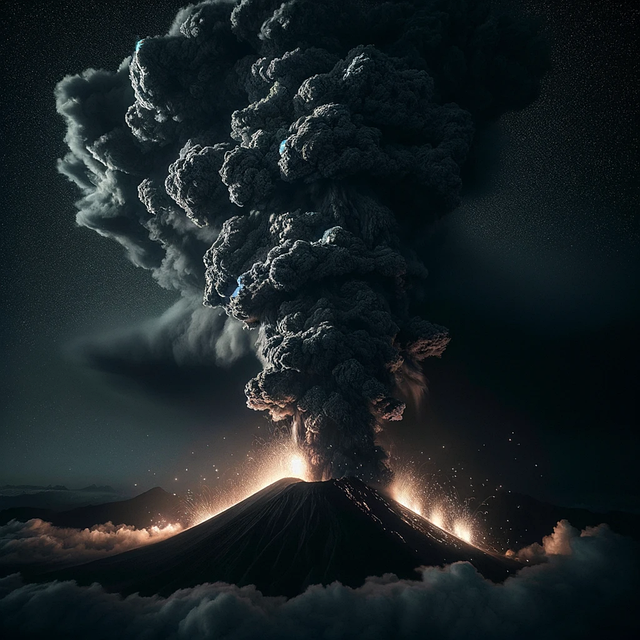Can Scientists Prevent Volcanic Eruptions?
- SMS Broadcaster Admin

- Jun 25, 2025
- 3 min read
Can scientists prevent volcanic eruptions? Every natural disaster can’t be prevented, even by scientists. Although unpredictable and can’t be prevented, it can be observed and predicted when they will occur from natural phenomena.
Can Scientists Prevent Volcanic Eruptions? Let’s Discuss!
Volcanic activity is dynamic, which is continuously changes in intensity and frequency. These changes can be detected with advanced and specific technologies. The results of these observations are used to analyze and predict the potential for volcanic disasters. This is a very important role for scientists in reducing the impact of eruptions.

The Role of Scientists in Volcanic Disaster Mitigation
Disaster management will be better if it is developed through scientific developments in related fields. Volcanology as a branch of geology needs to improve continuously to manage the volcanic disaster. This scope learns about the structure, formation process, volcanic activity, eruption materials, and geological phenomena related to volcanoes.
Scientists who focus on volcanology are key and play many important roles. Their role are monitoring volcanoes, conducting research, and providing information on geological disaster mitigation. The research continues to be developed because it reflects the changing phenomenon of volcanoes.
The results from various research are applied to overcome eruptions and evaluation is carried out continuously. The roles of scientists in volcanic disaster mitigation can be seen as follows.
Research and Understanding Disaster
The first role of scientists is to learn the condition of the volcano and its track record of activity in detail. After learning these conditions, they know how the activity patterns, the types of eruptions, also the impacts.
After understanding the object of the volcano, the next stage is to find out the disaster management efforts that have been made. Scientists will test the extent of the success of the system and conduct further research to create a better disaster management system with more adequate technology.
Mitigation
Can scientists prevent volcanic eruptions? No, the next role of scientists is disaster mitigation. It is a series of efforts made before, during, and after a disaster to reduce the impacts. In the case of a volcanic eruption, scientists first observe volcanic activity before the disaster occurs.
There are various tools used in volcanic observation. First is seismographs to detect volcanic earthquakes. Second, remote sensing or sensors to measure ground deformation. Third, portable instruments to measure gas emissions directly and satellite or drone data to measure indirectly.
The collected data will be analyzed to identify patterns and signs that may indicate an impending eruption. If there is a potential for eruption, scientists provide early warning to communities living around the volcano within a certain radius according to the impact analysis. It can give them time to evacuate and take precautions.
The data analysis by scientists encourages the arrangement of some evacuation plans, such as evacuation routes, evacuation posts, and supply locations, thereby significantly reducing the risk of loss of life and damage. When an eruption occurs, scientists continue to monitor conditions until after the disaster. The aim is to determine the current impact and the potential for the next eruption.
Evaluation
In addition to disaster mitigation programs carried out before, during, and after a disaster, there are evaluation programs. The evaluation aims to assess the accuracy of disaster mitigation efforts that have been implemented and to determine the extent to which targets have been achieved.
The results of the evaluation are used to improve the mitigation program. This evaluation is carried out periodically and then improving disaster management and reducing the impacts caused by volcanic eruptions. This can be achieved through cooperation between parties, such as the government, authorized institutions, community groups, and scientists who are members of the study center.
Post-Disaster Research
Scientists conduct research continuously to develop volcanology, solve the problems due to volcanic eruption disasters, and understand volcanic activity patterns to improve disaster mitigation. In this volcanic case, a dynamic of volcanic activity drives scientists to conduct post-disaster research. The results will help in making better policies for handling volcanic eruptions.
Volcanology continues to be developed. Can scientists prevent volcanic eruptions? They can't, but monitoring, prediction, and prevention can be done. An early warning system from the government is needed to reduce the impacts caused.
It can be realized with an emergency message-sending machine via SMS that is sent directly to every community's mobile phone. It makes the information spread quickly and evenly. The machine can be obtained directly and easily through smsbroadcaster.com.



Contact him for any type of hacking, he is a professional hacker that specializes in exposing cheating spouses, and every other hacking related issues. he is a cyber guru, he helps catch cheating spouses by hacking their communications like call, Facebook, text, emails, Skype, whats-app and many more. I have used this service before and he did a very good job, he gave me every proof I needed to know that my fiancee was cheating. You can contact him on his email to help you catch your cheating spouse, or for any other hacking related problems, like hacking websites, bank statement, grades and many more. he will definitely help you, he has helped a lot of people, contact him on,…